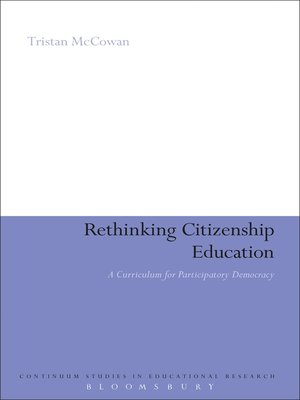Rethinking Citizenship Education
ebook ∣ A Curriculum for Participatory Democracy · Continuum Studies in Educational Research
By Tristan McCowan

Sign up to save your library
With an OverDrive account, you can save your favorite libraries for at-a-glance information about availability. Find out more about OverDrive accounts.
Find this title in Libby, the library reading app by OverDrive.



Search for a digital library with this title
Title found at these libraries:
| Library Name | Distance |
|---|---|
| Loading... |
Rethinking Citizenship Education presents a fundamental reassessment of the field. Drawing on empirical research, the book argues that attempting to transmit preconceived notions of citizenship through schools is both unviable and undesirable. The notion of 'curricular transposition' is introduced, a framework for understanding the changes undergone in the passage between the ideals of citizenship, the curricular programmes designed to achieve them, their implementation in practice and the effects on students. The 'leaps' between these different stages make the project of forming students in a mould of predefined citizenship highly problematic.
Case studies are presented of contrasting initiatives in Brazil, a country with high levels of political marginalisation, but also significant experiences of participatory democracy. These studies indicate that effective citizenship education depends on a harmonisation or 'seamless enactment' of the stages outlined above. In contrast, provision in countries such as the UK and USA is characterised by disjunctures, showing insufficient involvement of teachers in programme design, and a lack of space for the construction of students' own political understandings.
Some more promising directions for citizenship education are proposed, therefore, ones which acknowledge the significance of pedagogical relations and school democratisation, and allow students to develop as political agents in their own right.
Case studies are presented of contrasting initiatives in Brazil, a country with high levels of political marginalisation, but also significant experiences of participatory democracy. These studies indicate that effective citizenship education depends on a harmonisation or 'seamless enactment' of the stages outlined above. In contrast, provision in countries such as the UK and USA is characterised by disjunctures, showing insufficient involvement of teachers in programme design, and a lack of space for the construction of students' own political understandings.
Some more promising directions for citizenship education are proposed, therefore, ones which acknowledge the significance of pedagogical relations and school democratisation, and allow students to develop as political agents in their own right.







